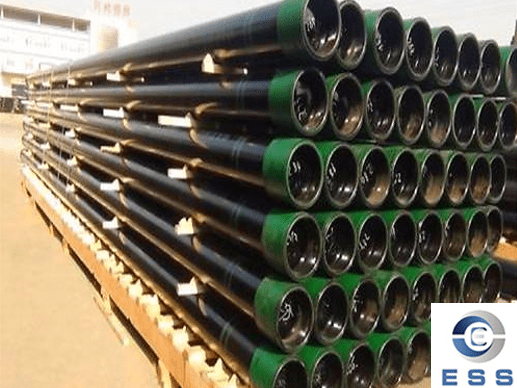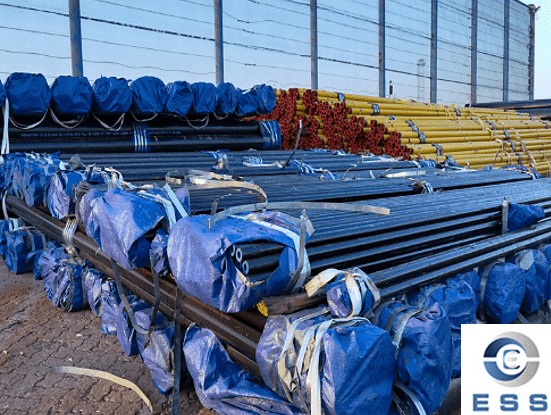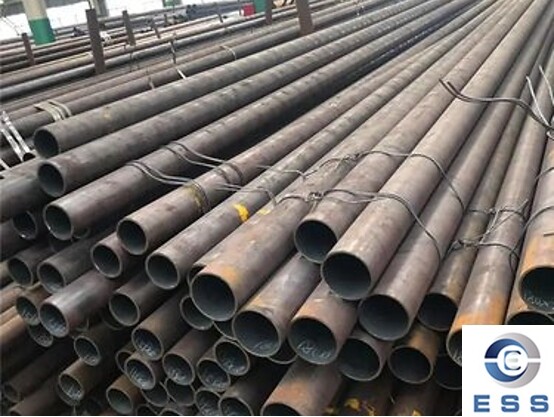Constructing a water well requires many
considerations, one of which is the well casing pipe.
Well casing pipe protects and maintains the wellhead, so choosing the right
material is crucial. Well casing pipe is commonly made of carbon steel,
stainless steel, PVC, and fiberglass. When selecting the right material,
consider a variety of factors, including well
casing pipe specifications, well depth, geological conditions, water
quality, budget, and service life.
Main Functions of Well Casing Pipe
1. Wellhead protection
By covering the wellhead area, it
effectively blocks foreign contaminants such as sand, fallen leaves, and
insects, while also preventing rust and leakage caused by accumulated
precipitation.
2. Well wall reinforcement
Well casing pipe is tightly integrated with
the well wall, providing structural support and preventing well wall collapse,
soil erosion, and groundwater infiltration, ensuring the long-term stability of
the well structure.
3. Water quality assurance
By isolating the wellhead from sediment and
harmful substances, maintaining water source hygiene standards, and providing
fundamental protection for drinking water safety.

Carbon Steel Casing Pipe
Carbon steel is a common material used for
well casing pipe. Common specifications range from 114mm to 508mm in diameter,
with a wall thickness of 6mm to 12mm.
1. Advantages
Economical and Durable: Carbon steel is an
inexpensive and very strong material.
High Strength and Pressure Resistance:
Carbon steel well casing pipe can withstand the high pressures and formation
stresses found in deep wells, making it less prone to failure and even suitable
for deep wells.
Affordable Cost and Easy Processing: The
manufacturing and welding processes are mature, and the market is widely
available.
2. Disadvantages
Corrosion susceptibility: The primary
disadvantage of carbon steel well casing pipe is its susceptibility to
corrosion. Carbon steel rusts when in contact with water. High mineral and salt
concentrations in well water accelerate rusting. The spread of rust can
undermine the structural integrity of the well casing pipe, leading to its
collapse.
High maintenance cost: Without corrosion
protection, the service life may be only 10 to 20 years.
3. Corrosion prevention
Use hot-dip galvanizing, epoxy coating, or
cathodic protection technology;
Regularly monitor the pH and salinity of
your well water;
For highly corrosive water, stainless steel
can be an alternative, but it is significantly more expensive than carbon
steel.
Stainless Steel Casing Pipe
Common stainless steel casing pipe types
include 304 and 316L, with custom outer diameters exceeding 600mm.
1. Advantages
Extremely high corrosion resistance:
Stainless steel (such as 304 and 316L) performs well in acidic, alkaline, and
high-salt environments. If you want to prevent rusting, choose stainless steel.
Long service life: Stainless steel casing
pipe has a service life of approximately 40 years or more.
Sanitary and safe: It does not release
harmful substances and meets drinking water standards (one of the recommended
materials in the AWWA C200 standard).
2. Disadvantages
Expensive: Using stainless steel reduces
the risk of rust, but it increases the overall cost of the well installation. The total cost is approximately 3 to 5 times that of carbon steel.
High
processing and transportation costs: Heavy weight and demanding welding
requirements.
3. Applicable applications
High-end
residential buildings, medical institutions, food processing facilities, or
areas with corrosive groundwater.
PVC Casing Pipe
PVC well casing pipes typically have an
outer diameter of 50mm to 400mm, a wall thickness of 4mm to 10mm, and standard
lengths of 3 meters or 6 meters.
1. Advantages
Corrosion resistance: PVC is unaffected by
acids, alkalis, or salts, making it corrosion-resistant and highly strong.
Affordability: PVC is also relatively
affordable, making it a good choice for those on a limited budget who want to
save on installation costs. The cost is only 30% to 50% of that of carbon
steel.
Lightweight and easy to install:
Significantly reduces installation complexity.
2. Disadvantages
Limited strength: PVC is not as strong as
carbon steel, which increases the risk of overall well collapse. If the casing
pipe fails, the well and the pump may be damaged.
Poor high-temperature resistance: Prolonged
temperatures exceeding 60°C can affect performance.
Brittle: Exposure to sunlight can cause aging and brittleness.
3. Usage
PVC is commonly used in modern water well casing
pipes. PVC well casing pipes are suitable for shallow and medium-depth wells
(generally less than 150 meters) and should be avoided in areas with high
ground stress or high temperatures.
If you choose PVC, you must conserve water
during droughts to maintain well pressure.
FRP Casing Pipe
Common diameters for FRP casing pipes range
from 100mm to 500mm, with wall thicknesses of 8mm to 15mm.
1. Advantages
Corrosion-resistant and rust-resistant: If
you're unsure about steel or PVC, fiberglass is a good choice; casing pipe made
from fiberglass does not corrode.
Strong and lightweight: Fiberglass is
generally stronger than PVC and has only a quarter the density of steel, making
it an ideal choice for ensuring casing pipes are resistant to failure.
Long service life: Up to 30 years or more.
Easy to install: Customizable lengths make
it easy to transport and connect.
2. Disadvantages
Affordable: It is generally cheaper than
stainless steel but more expensive than PVC.
Limited impact Resistance: Its impact
resistance is slightly lower than that of steel, so avoid hard impacts during
installation.
Thermal expansion: Its thermal expansion
coefficient is relatively high, so allowance for expansion and contraction is
required when used in high-temperature formations.
3. Application scenarios
It is ideally suited for saline-alkali
formations or chemically charged groundwater, suitable for medium-deep wells,
highly corrosive underground environments, or projects requiring long-term,
stable water supply.
FAQ
1. Which well casing pipe material is the
most corrosion-resistant?
Stainless steel and fiberglass reinforced
plastic (FRP) are the most corrosion-resistant materials.
Stainless steel resists corrosion from
acids, alkalis, and salts and is suitable for highly mineralized groundwater or
groundwater containing chloride ions. Fiberglass is completely rust-resistant
and is suitable for chemically corrosive environments or saline-alkali
formations.
2. Why does carbon steel casing pipe rust
easily?
Carbon steel undergoes electrochemical
corrosion in oxygenated and salty water, forming iron oxide (rust). Especially
when water contains carbon dioxide, hydrogen sulfide, or high salt ions, the
corrosion rate is significantly accelerated.
3. Which well casing pipe offers the best
cost-effectiveness?
From the perspective of comprehensive
performance and cost:
For shallow wells: PVC is the most
cost-effective;
For medium-deep wells or corrosive
environments: Fiberglass reinforced plastic (FRP) offers the best balance;
For high-end projects or extreme
environments: Stainless steel offers the best performance.
4. Which material should be used for
agricultural irrigation wells?
For agricultural irrigation wells with
greater depth or complex water conditions, carbon steel or fiberglass
reinforced plastic (FRP) can be selected, balancing cost and strength.
Summary
The applications
of well casing pipe is various and their different materials are
suitable for different scenarios. Understanding the characteristics, advantages
and disadvantages of different well casing pipe materials and selecting the
appropriate well casing pipe material is crucial to ensuring long-term stable
well operation and water quality safety.













 Eastern Steel Manufacturing Co.,Ltd not only improve product production and sales services, but also provide additional value-added services. As long as you need, we can complete your specific needs together.
Eastern Steel Manufacturing Co.,Ltd not only improve product production and sales services, but also provide additional value-added services. As long as you need, we can complete your specific needs together.










